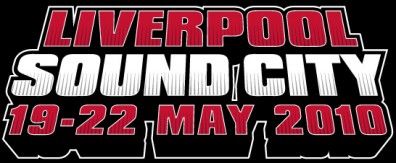Liverpool Sound City: 2010
Friday 21st May
Hard Days Night Hotel – Technology Summit
Panels & Keynote Speakers
10.00 – 10.45 : Panel 1 – New Player in the New Digital Age. With the Digital landscape ever changing, this panel gives you access to the new movers and shakers in the industry who are using technology to give them advantages in a world where outdated models run the industry. With the Internet opening up doors to savvy youngsters looking to make their mark in the industry, models are changing and the way things ‘have always been’ are now being done differently. Here is your chance to hear how people are changing processes and allowing artists and the wider industry to make money from the ‘threat’ that is the Digital Space. Panellists: Chris Meehan – Sentric Music Sergio Pimentel – ActiVision David Courtier-Dutton – Slice The Pie Jeff Marshall – Harmonix/MTV.
11.00 – 11.45 : Panel 2 – Traditional Licensing in a Digital Age. In the light of the YouTube/PRS for Music debacle, which saw content restrictions put in place for UK users, this panel aims to look at how licensing is being taken care of with Digital businesses such as MySpace, YouTube and Spotify. Are the ‘low value’ royalties more beneficial to the artist than the current deals that are in place with traditional outlets? Let the experts argue the toss. Panellists: Rob Swerdlow – Starwood Management Chris Cooke - CMU Scott Cohen – The Orchard Eric Mackay – CELAS.
12.00 – 12.45 Scott Cohen interviews Richard Gotthrer (The Orchard)
LIVERPOOL SOUND CITY: THINK BIG BY THINKING SMALL
While music marketers are paid to think big, when you’re launching a new band you need to think small. That was the key message from the digital marketing panel at Liverpool Sound City.
“The old model in the music business was based on selling one record to as many people as possible”, the Orchard’s Scott Cohen observed. “Because you only had one thing to sell any one fan, that was your latest album. Once you sold a new fan your record they were no use to you, unless they could persuade someone else to buy your record. Bands and labels were therefore seeking audiences of thousands and millions for commercial success. But many fans are willing to buy more than one product from you, if you only provide the right kind of products. Why go to the effort of selling two CDs to two fans, when you can sell two CDs to one?”
The importance and potential of a band finding and engaging a core fanbase, even if that fanbase is relatively modest in size, has been a key theme at LSC this year. “You increasingly meet new bands at events like this who have been sold on the importance of a big sync deal, and who are therefore desperately hoping to get the call from a TV boss or gaming exec”, SliceThePie’s David Courtier-Dutton added.
“But let’s be realistic about this”, he continued, “there are 100 million tracks out there competing for a sync deal, the chances of a new band getting that kind of deal are remote. What new bands should be doing is building and learning about their fan base. That’s the starting point for everything that can follow. Even a modest fan base can be enough to turn your band into a viable business.”
And the ‘learning about’ bit is very important. As with the similar panel at The Great Escape this year, the importance of fan analytics dominated as a key message. “Understanding your fanbase is key”, says Topspin co-founder Shamal Ranasinghe. “Know who your fans are, where they are, how they differ. Use free stuff to hook in casual fans, work out who will pay more, and who will pay most, and consider what products they will pay for, and make those products.”
Cliff Fluet of legal firm Lewis Silkin agreed. “We hear a lot about the monetisation of music, but we need to think about the productisation of music. Whether you’re the label working with recordings, or the artist with a wider range of things to sell, we need to get away from one size fits all, and when people want to spend more money, make it easy for them to do so.”
So, how do you use the Internet to launch your band? Use analytic tools to find and learn about both your core and casual fanbase, and then devise products that the will buy and which some will pay a premium for. Thinking small in that way, it seems, could create big results..
13.45 – 15.15 Round Table Discussion Sessions
15.30 – 17.00 Focus Innovation & NWVM present Sound City Labs (FOCUS & NWVM LOGOS)
5 dynamic young companies have beaten off competition to pitch their most innovative ideas to a small panel of industry experts and the wider Sound City delegation. Companies chosen are: -
Splinter Design Communications – an award winning multi-disciplinary design studio based in Liverpool City Centre who specialise in the production of new media, corporate identity and printed solutions for a diverse range of clients including the BBC, the British Museum, Sony etc.
Damibu – Damibu creates unique integrated online solutions using: social network services, such as Facebook; mobile devices, such as the iPhone, and games consoles, such as the PlayStation 3. Utilizing knowledge of digital commerce and redefining possibilities to create engaging and profitable online experiences.
Citrus Suite – Founded to produce original games for digital distribution and to develop innovative new media solutions. The company has been providing production services to video game developers for a number of years and has had work released on all current-gen consoles.
Smiling Wolf – A creatively-led, independent studio, established in 2000 with the desire to produce considered, well-crafted design. The award winning team work with a variety of clients, across several sectors; only partnering with people and organisations they believe in, to help deliver engaging and effective solutions.
Onteca - An interactive media company that works with some of the most difficult emerging technologies in both the creative and digital sector.
|
|

|

The All-American Rejects |
LATEST GALLERY IMAGES

The Evil of Netanyahu 
Snow Patrol 2025 |
|
Advertising
|
|


